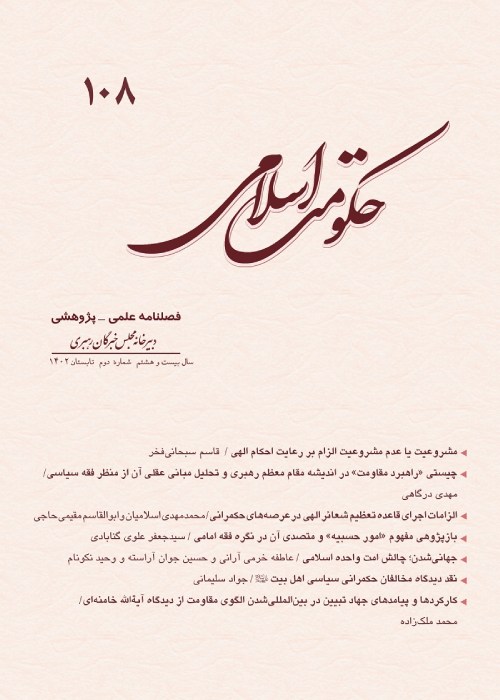The Role and the Status of the Muslim Guardian Jurist in Selecting and Appointing the Agents of the Islamic System as Depicted and Stipulated in Political Fiqh and the Constitutional Law of the Islamic Republic of Iran
Author(s):
Abstract:
According to the fiqhi arguments, the guardianship of and the rule over the Muslim community at the time of occultation is entrusted to a qualified Muslim guardian jurist. On the one hand, the legal guardianship is something general and covers all aspects of governmental affairs. On the other hand, given the fact that there are a variety and wide range of governmental affairs, the Muslim guardian jurist alone is not able to directly play his role in taking care of the affairs in the Muslim community and in running the governmental affairs personally. Therefore, as anticipated in the constitutional law of the Islamic Republic of Iran, the Muslim guardian jurist has to entrust part of his duties and authority to some other individuals and groups. Now, the question is that, from the jurisprudential perspective and according to the constitutional law, what is the role and status of the Muslim guardian jurist in selecting and appointing the agents of the Muslim community? Are the agents of the Islamic system necessarily appointed by the Muslim guardian jurist or there is no need for the agents to be appointed by the Muslim guardian jurist? Drawing upon an analytical and descriptive method, this article aims at providing answers to the questions above by making reference to the role infallible Imams play in appointing governmental agents. Then a discussion is raised as to the opinions and views and practical life-style of the faqihs during the history of ShiÝism. This article also seeks to establish the fact that, from the perspective of the constitutional law of the Islamic Republic of Iran, the selection and appointment of the agents in the Islamic system is entrusted to the Muslim guardian jurist and the legal guardianship of the Muslim jurist is extended to include the other governmental structures and executive authorities, and, in this light, their measures and decisions are made legitimate.
Keywords:
Language:
Persian
Published:
Journal of Islamic government, Volume:19 Issue: 4, 2015
Page:
31
magiran.com/p1443821
دانلود و مطالعه متن این مقاله با یکی از روشهای زیر امکان پذیر است:
اشتراک شخصی
با عضویت و پرداخت آنلاین حق اشتراک یکساله به مبلغ 1,390,000ريال میتوانید 70 عنوان مطلب دانلود کنید!
اشتراک سازمانی
به کتابخانه دانشگاه یا محل کار خود پیشنهاد کنید تا اشتراک سازمانی این پایگاه را برای دسترسی نامحدود همه کاربران به متن مطالب تهیه نمایند!
توجه!
- حق عضویت دریافتی صرف حمایت از نشریات عضو و نگهداری، تکمیل و توسعه مگیران میشود.
- پرداخت حق اشتراک و دانلود مقالات اجازه بازنشر آن در سایر رسانههای چاپی و دیجیتال را به کاربر نمیدهد.
In order to view content subscription is required
Personal subscription
Subscribe magiran.com for 70 € euros via PayPal and download 70 articles during a year.
Organization subscription
Please contact us to subscribe your university or library for unlimited access!



